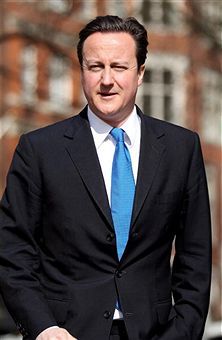 Last week, it was all doom, gloom, debt, the deficit and austerity from the Tories – and rightly so. But, this week, they’ve returned to the sunny uplands. First, we had George Osborne’s tax cut for seven out of every ten people. And, today, we had David Cameron’s closing speech at the Tory Big Society event. I lost count of how many times he dropped words like “hope” and “change”. And, yes, he even namechecked Barack Obama. But don’t give up just yet – there was more to it than that.
Last week, it was all doom, gloom, debt, the deficit and austerity from the Tories – and rightly so. But, this week, they’ve returned to the sunny uplands. First, we had George Osborne’s tax cut for seven out of every ten people. And, today, we had David Cameron’s closing speech at the Tory Big Society event. I lost count of how many times he dropped words like “hope” and “change”. And, yes, he even namechecked Barack Obama. But don’t give up just yet – there was more to it than that.
Cameron’s main point was, effectively, a dividing line: between what he called the “short-term” and “centralised” politics of Labour, and what he sees as a longer-term, more expansive version of the state – one which empowers people to act on behalf of themselves and their communities. We already know the rough outlines of this: data freedom, Gove’s school reforms, elected police commissioners, that kind of thing. But, today, there were a few more details. The Tories would, for instance help train an “army” of 5,000 or so community organisers, and there’d be a Big Society Bank to direct funds towards social enterprises.
But would it work? Well, the biggest question the Tories face is whether people would actually take up the powers that are being handed over to them. On that front, Cameron cited a few examples – including the New Schools Network – where take-up of responsibilities has already been pretty, if not overwhelmingly, impressive. And, more concretely, he said that new neighbourhood grants would be directed towards the deprived areas and groups which need them most – by way of an incentive.
Even so, much of this rests on Cameron’s self-professed “optimistic view of human nature,” according to which people are clamouring to get involved in society and all that. Whether you, I or the electorate share this view is another matter altogether. But the Tory message is that they will put the framework in place to encourage and allow this type of action to happen. Only time will really tell whether it does or not, and whether it creates something which Cameron is selling as the Welfare State Mark II.
That may sound kinda vague. It probably is. But, I must admit, I thought Cameron was quite impressive today. Despite what many may regard as left-leaning nods towards community organisation etc., this was, at its core, a positive conservative message about decentralisation and the power of the individual. Indeed, throw in that Osborne tax cut, and there are signs that the Tory agenda is solidifying by the day.






Comments